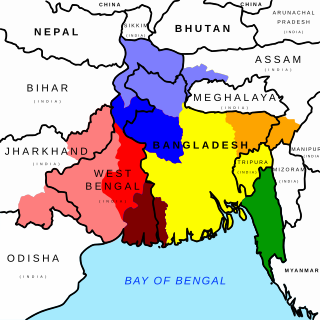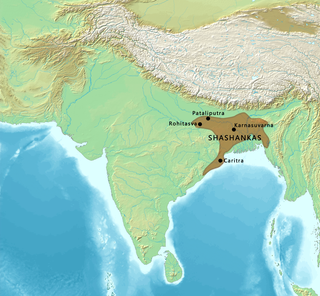Related Research Articles
Chandrasekhar, Chandrashekhar or Chandra Shekhar is an Indian name and may refer to a number of individuals. The name comes from the name of an incarnation of the Hindu god Shiva. In this form he married the goddess Parvati. Etymologically, the name comes from the Sanskrit words "चन्द्र (candra)", meaning "moon", and "शेखर (śekhara)", meaning "crest" or "crown", which is an epithet of the Shiva.
Krishna is a Hindu deity.
Suresh is an Indian masculine given name originating in the Sanskrit word sureśa. Its meaning is "Ruler of Gods" and it has been used an epithet for the Hindu gods Indra, Brahma, Vishnu and Shiva.

Shashanka was the first independent king of a unified polity in the Bengal region, called the Gauda Kingdom and is a major figure in Bengali history. He reigned in the 7th century, some historians place his rule between circa 600 CE and 636/7 CE, whereas other sources place his reign between 590 and 625 CE.
Santosh, also spelled as Santhosh, is a masculine given name. The name means "Confidence" or "Leader".
Manish is a common Hindu masculine given name that literally means "The God of the Mind" or the one who has controlled and mastered one's mind, derived from the Sanskrit words "man" (mann) which means Mind and "ish" which refers to God or master. Many Hindu male children are given this name. It is a popular name in central and northern parts of India.
Ravi Kumar or Ravikumar is Hindu given name, which means "Son of the Sun", combining the Sanskrit words "Ravi" (Sun) and "Kumar" (Son). The name may refer to:
Prabhu means master or the Prince in Sanskrit and many of the Indian languages; it is a name sometimes applied to God. The term is also used by devotees of the Hindu God Lord Krishna/Vishnu as a title and form of address. It is also appended after a devotee's name, for example "Madhava Prabhu". In Indonesia, especially in Balinese, Javanese, and Sundanese culture, the term "Prabu" is used as a part of royal titles, especially to address Kings such as Prabhu Siliwangi, Prabu Kiansantang, etc.
Dinesh is a common Hindu male given name. The Sanskrit word dineśa is a compound of dina 'day' and īśa 'lord', meaning 'day-lord', an epithet of the Sun. Notable people with the name include:
Prakash is a common given name in Asian, Hindu, Sanskrit names and widely used in Nepal, India and Sri Lanka. Prakash is generally used as a masculine name. The word prakash is derived from the Sanskrit word "prakāśa", meaning "bright light" or "sun light" or "moon light" or "light". Metaphorically, it designates the person as a source of enlightenment or wisdom. From the Sanskrit 'pra' meaning "forth" and 'kāśa' meaning "shining." Hence the meaning "luminous; shining forth".
Ramesh is a given name among Indians. It is also an Indian masculine given name from Sanskrit, diminutive of Rameshvara (Rāmeśvara), an epithet of Shiva. It is used among Hindus, Jains and Buddhists and some Christians.
Subramaniam, Subrahmanyam, Subramanyam or Subramanian is a South Indian male given name. Due to the South Indian tradition of using patronymic surnames it may also be a surname for males and females. The etymology of the name is from Sanskrit; however, a common translation is "dear to Brahmam", or "of good deeds". An alternative proposed translation is derived from merging two common Sanskrit words supri-ya, meaning "good" or "dear," and man-ya, meaning jewel; the name translates loosely as "worthy jewel". Subramaniam is one of the many names of the Hindu god Karthikeya, also known as Kumara or Murugan.
Sundar is an adjective signifying attractive, beautiful, good, handsome or nice. It has its origin in Sanskrit language. The word is also used as names of people by speakers of languages branching off of Indo-Aryan languages.
Srinivasa is a Hindu name. The term Srinivasa is Vaishnava in origin, the combination of two Sanskrit words, Shri (श्री) and nivasa (निवास).
Manohar is an Indian surname and given name. Notable people with the name include:
Anup is an Indian masculine given name. The Sanskrit word anūpa has the following meanings: 'watery', 'situated near the water', 'bank of a river', 'pond', 'lagoon'.The meaning of the name “Anup” is: "Incomparable, unequalled; unique; pond.

The Bengali Calendar or Bangla Calendar, colloquially, is a solar calendar used in the Bengal region of the Indian subcontinent. A revised version of the calendar is the national and official calendar in Bangladesh and an earlier version of the calendar is followed in the Indian states of West Bengal, Tripura and Assam. The New Year in the Bengali calendar is known as Pôhela Boishakh. The calender was introduced by Emperor Shashanka of Gauda. The rise of Shashanka from a Samanta Raja to the sovereign ruler of Bengal coincides with that of the beginning of the Bangabda.

The Gauḍa Kingdom or Shashankas, was a classic kingdom during the Classical period on the Indian subcontinent, which originated in the Gauda region of Bengal in 4th century CE or possibly earlier.
The name Sachin is derived, via Indic languages like Bengali and Marathi, from the Sanskrit name Shachindra. Shachindra is a name given to Hindu god Indra which means Shachi's Indra. Shachi was one of the wives of Indra. It is also a name of Hindu god Shiva. The literal meaning can be roughly translated into English as "the essence".
Akshat is a popular male given name in Hindu and Buddhist cultures. It is a name derived from the Sanskrit word 'Aksata' meaning, uninjured.